|
|
|
Sort Order |
|
|
|
Items / Page
|
|
|
|
|
|
|
| Srl | Item |
| 1 |
ID:
116199
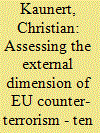

|
|
|
|
|
| Publication |
2012.
|
| Summary/Abstract |
This special issue has investigated the external dimension of European Union's (EU) counter-terrorism in much more detail than ever before. EU's counter-terrorism policy has been criticized on various grounds, ranging from questioning its efficiency, to coherence and implementation. On the one hand, the EU is characterized as a 'paper tiger', while, on the other hand, scholars point out that the EU has taken great strides toward increasing integration and encouraging cooperation between member states since 9/11. This underlines the complexity of the security environment, shaped by the threat of terrorism, in which the EU functions. Despite those efforts to provide a direction and achieve more concerted European action in the field of security, there are still many unanswered questions. Following the 11 March 2004 attacks on Madrid, which killed almost 200 people, the EU underlined the importance of deepening the international consensus to combat terrorism, which made it an increasing actor in global counter-terrorism efforts. The excellent articles in this special issue are testimony to the importance of analysing these developments.
|
|
|
|
|
|
|
|
|
|
|
|
|
|
|
|
| 2 |
ID:
116195
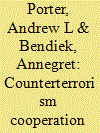

|
|
|
|
|
| Publication |
2012.
|
| Summary/Abstract |
While the notion of a European security community encounters little resistance in the security community literature, the transatlantic security community, comprised of the European Union (EU) and United States of America (USA), has suffered routine criticism in the aftermath of 9/11. This article seeks to lend empirical support to the claim that the transatlantic security community is alive and well, though not without its political arrhythmias. Drawing on the idea that community membership enhances norm convergence, this article examines the process of norm convergence in EU-US counterterrorism cooperation. We argue that the recent EU-US agreements on Passenger Name Records and the Terrorist Finance Tracking Programme represent a form of cooperation, that is, the convergence of values, which is essential for late-stage security community integration. Detainee practices, however, represent a harder case for the transatlantic security community. Despite these difficulties, we argue that this controversy does not preclude a priori the possibility of agreement. Although these transatlantic differences might shake the foundations of the EU security community, we argue that the current controversies provide an opportunity for the EU to reaffirm its commitment to its values, thus reinforcing its foundations as an independent security community. This account of cooperation, political disagreement notwithstanding, upsets the Kaganian account of transatlantic relations.
|
|
|
|
|
|
|
|
|
|
|
|
|
|
|
|
| 3 |
ID:
116198
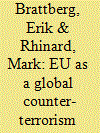

|
|
|
|
|
| Publication |
2012.
|
| Summary/Abstract |
After the terror attacks of 11 September 2001, the European Union (EU) staked its claim as an important international player in the fight against global terrorism. The EU encouraged new initiatives at the United Nations and devoted newfound attention to aid and assistance programs to third states. The EU's ambitions and heightened activity prompts a number of questions about rhetoric versus action and offers a useful test case for assessing the quality of the EU's 'actorness'. This article applies the actorness concept to shed light on the EU's behaviour in global counter-terrorism activities. It draws together existing insights on actorness into an analytical framework containing four sets of variables - context, coherence, capability and consistency - and applies the framework to evidence gathered on the EU's international and third country role in countering terrorism. Our results show that the actorness approach sheds considerable light on the EU's international behaviour in global counter-terrorism and suggests the EU has some way to go before becoming a full actor in this area.
|
|
|
|
|
|
|
|
|
|
|
|
|
|
|
|
| 4 |
ID:
116196
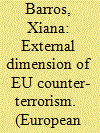

|
|
|
|
|
| Publication |
2012.
|
| Summary/Abstract |
Since 11 September 2001, the European Union (EU) has significantly increased its involvement in counter-terrorism. A sizeable cluster of those new EU counter-terrorism acts were challenged in front of the European Court of Justice, and many of those acts ended being annulled by the Court. In the foreign dimension, the European Parliament challenged three counter-terrorist acts: the first Transatlantic Agreement on passenger name records, the EU technical assistance to the Philippines and the EU UN terror list. The analysis of the nature and implications of these three cases shed light on the evolving configuration of the EU foreign policy in terms of both institutional design and ideological choices.
|
|
|
|
|
|
|
|
|
|
|
|
|
|
|
|
| 5 |
ID:
116193
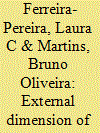

|
|
|
|
|
| Publication |
2012.
|
| Summary/Abstract |
Having recently completed its first decade of existence, the EU's counter-terrorism policy has been receiving increasing scholarly attention as reflected in the specialized literature devoted to this emerging policy area. Its external dimension, nevertheless, has not been the subject of thorough and systematic analyses which scrutinize its characteristic features and principal actors, policies and interests. Against this backdrop, the introductory article of this Special Issue aims at providing a contextualised assessment of the external dimension of EU counter-terrorism while discussing the impact of the Lisbon Treaty upon this policy field. It proceeds with an examination of the policies, interests and actorness dynamics associated with the EU's counter-terrorism policy in highlighting the major findings and conclusions conveyed by the five contributions to this Special Issue. Its conclusion points to possible avenues for future research on the basis of identified underdeveloped topics, under-theorised aspects and neglected issues in the existing literature.
|
|
|
|
|
|
|
|
|
|
|
|
|
|
|
|
| 6 |
ID:
116194


|
|
|
|
|
| Publication |
2012.
|
| Summary/Abstract |
The construction of the Area of Freedom, Security and Justice has seen the pooling of a significant amount of national sovereignty at the European Union (EU) level through the establishment of internal EU competences. This process has also had the important side-effect of an increasing development of an EU interest in various areas of security, including in counter-terrorism. This article examines the processes through which the EU interest in counter-terrorism is constructed. It argues that, in line with social constructivist literature, it is important to conceptualise interests as being mutually constituted through interactions amongst political actors. It further develops two arguments in this respect. First, the United States (US) has exercised significant influence on the shaping of the EU interest in counter-terrorism. This point is particularly well-illustrated by the Passenger Name Record case. The second argument put forward by this article is that the process through which the EU interest is shaped has become increasingly complex, in particular following the entry into force of the Lisbon Treaty, which reinforced the powers of the European Parliament. A particularly apt illustration of this argument is the case of the SWIFT (Society for Worldwide Interbank Financial Telecommunication) Agreement.
|
|
|
|
|
|
|
|
|
|
|
|
|
|
|
|
| 7 |
ID:
116197


|
|
|
|
|
| Publication |
2012.
|
| Summary/Abstract |
Launched in 1999, the European security and defence policy (ESDP)/common security and defence policy (CSDP) was not conceived as a tool to fight terrorism. This threat was traditionally considered as being of an internal nature and, thus, deemed to be addressed under the European Union's (EU) third pillar. However, the events of 11 September 2011 contributed to a shift in this approach, with several documents acknowledging the importance of the contribution of CFSP, including ESDP, in the fight against terrorism. At the rhetorical level, this idea has been consistently conveyed in the EU's framework documents and policy papers since then. Yet, both civilian and military missions undertaken in the CSDP's realm have not been systematically used to fight terrorism. Against this background, this article aims to examine the lack of impact of such missions in the framework of the Union's counter-terrorism and to discuss developments arising from the Lisbon Treaty's CSDP-related provisions. Based on an analysis of both EU missions' mandates and EU official documents, this article demonstrates that CSDP has not been used to fight terrorism nor has been transformed by the emergence of an EU counter-terrorism policy. It further puts forward three tentative causal explanations for this paradox while arguing for the existence of room for a change in this regard.
|
|
|
|
|
|
|
|
|
|
|
|
|
|
|
|
|
|
|
|
|